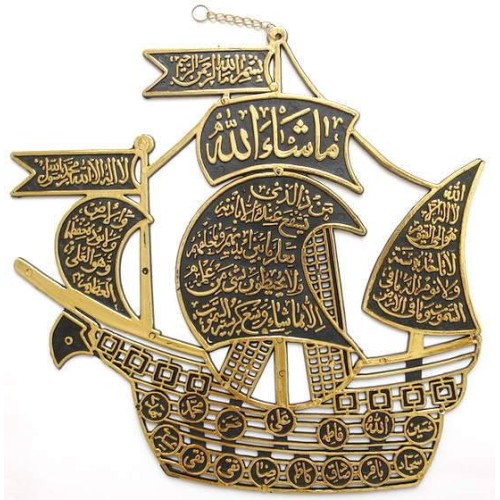- On sale!







Iran Islam Shia safīnat an-najāt ( Ship of Salvation ) Ayat Al-Kursy & 14 Masoom Name Plastic Wall Hanging
26.5 cm x 26.5 cm
The Wall Hanging depicts the safīnat an-najāt that in Islamic Hadith is to save souls in the Seas of Sins.
On the Hulk is written the Holy Names of Allah, Prophet Muhammad, His Daughter Fatimah & Imam Ali & other Imams ending with the Name of Imam Mahdi AS.
The Highest flag has the Bismillah Al-Rahman Al-Raheem that is the first Verse of Surahs of the Holy Quran. Under it is written Masha-Allah. The 3rd Flag on the left side has the writing La Ilah-a Il-lallah, Muhammad Rasulollah that means There is no god but Allah & Muhammad is the Messanger of Allah.
On the Ship Sails is the Ayat Al-Kursi.
Bismillahir-Rahmanir-Raheem = In the Name of Allâh, the Most Gracious, the Most Merciful.
Allahu la ilaha illa Huwal Haiyul-Qaiyum = Allah! There is no god but He – the Living, The Self-subsisting, The Eternal.
La ta'khudhuhu sinatun wa la nawm = No slumber can seize Him Nor Sleep.
lahu ma fis-samawati wa ma fil-'ard = His are all things In the heavens and on earth.
Man dhal-ladhi yashfa'u 'indahu illa bi-idhnih = Who is there can intercede In His presence except As he permitteth?
Ya'lamu ma baina aidihim wa ma khalfahum = He knoweth What lies Before them (His Creation) and After them
wa la yuhituna bi shai'im-min 'ilmihi illa bima sha'a = Nor shall they compass Aught of his knowledge Except as He willeth
Wasi'a kursiyuhus-samawati wal ard = His throne doth extend Over the heavens And the Earth
wa la ya'uduhu hifdhuhuma Wa Huwal 'Aliyul-Adheem = and He feeleth No fatigue in guarding And preserving them, For He is the Most High. The Supreme (in glory).
(This Verse 2:255 is called Ayat al-Kursi)
اللّهُ لاَ إِلَهَ إِلاَّ هُوَ الْحَيُّ الْقَيُّومُ لاَ تَأْخُذُهُ سِنَةٌ وَلاَ نَوْمٌ لَّهُ مَا فِي السَّمَاوَاتِ وَمَا فِي الأَرْضِ مَن ذَا الَّذِي يَشْفَعُ عِنْدَهُ إِلاَّ بِإِذْنِهِ يَعْلَمُ مَا بَيْنَ أَيْدِيهِمْ وَمَا خَلْفَهُمْ وَلاَ يُحِيطُونَ بِشَيْءٍ مِّنْ عِلْمِهِ إِلاَّ بِمَا شَاء وَسِعَ كُرْسِيُّهُ السَّمَاوَاتِ وَالأَرْضَ وَلاَ يَؤُودُهُ حِفْظُهُمَا وَهُوَ الْعَلِيُّ الْعَظِيم
Transliteration of Arabic
Here is a normal phonological transcription: al-lāhu lā ilāha illā huwa l-ḥayyu l-qayyūmu lā taʾḫuḏuhu sinätu-n wa lā nawmu-n lahu mā fī s-samawāti wa mā fī l-arḍi man ḏā llaḏī yašfaʿu ʿindahu illā bi iḏnihi yaʿlamu mā bayna aydīhim wa mā ḫalfahum walā yuḥīṭūna bi šayʾi-n min ʿilmihi illā bi mā šāʾa wasiʿa kursiyuhu s-samawāti wa l-arḍa walā yaʾuduhu ḥifẓuhumā wa huwa l-ʿaliyyu l-ʿaẓīm.
Phonetic assimilation (tajweed) is left unmarked, since it is completely regular and predictable. In this respect, the Arabic of the Qur'an is no different than any other language. Qur'anic tajweed has nasal sounds and conditioned lengthening that do not exist in modern Arabic phonetics.
The 6th Imam, Ja~far as-Sadiq has said:
لَمَّا أَمَرَ اللَّهُ عَزَّ وَ جَلَّ هَذِهِ الْآيَاتِ أَنْ يَهْبِطْنَ إِلَى الْأَرْضِ تَعَلَّقْنَ بِالْعَرْشِ وَ قُلْنَ أَيْ رَبِّ إِلَى أَيْنَ تُهْبِطُنَا إِلَى أَهْلِ الْخَطَايَا وَ الذُّنُوبِ فَأَوْحَى اللَّهُ عَزَّ وَ جَلَّ إِلَيْهِنَّ أَنِ اهْبِطْنَ فَوَ عِزَّتِي وَ جَلَالِي لَا يَتْلُوكُنَّ أَحَدٌ مِنْ آلِ مُحَمَّدٍ وَ شِيعَتِهِمْ فِي دُبُرِ مَا افْتَرَضْتُ عَلَيْهِ مِنَ الْمَكْتُوبَةِ فِي كُلِّ يَوْمٍ إِلَّا نَظَرْتُ إِلَيْهِ بِعَيْنِيَ الْمَكْنُونَةِ فِي كُلِّ يَوْمٍ سَبْعِينَ نَظْرَةً أَقْضِي لَهُ فِي كُلِّ نَظْرَةٍ سَبْعِينَ حَاجَةً وَ قَبِلْتُهُ عَلَى مَا فِيهِ مِنَ الْمَعَاصِي وَ هِيَ أُمُّ الْكِتَابِ وَ شَهِدَ اللَّهُ أَنَّهُ لا إِلهَ إِلَّا هُوَ وَ الْمَلائِكَةُ وَ أُولُوا الْعِلْمِ وَ آيَةُ الْكُرْسِيِّ وَ آيَةُ الْمُلْكِ
“When Allah, the Noble and Grand, commanded the verse (mentioned at the end of this tradition) to descend down to the Earth, they (the verses) attached themselves to the Throne (of Allah) and said, ‘O Lord! Where are you sending us to? Are you sending us to a place of [the People of] transgressions and sins?’ Allah, the Noble and Grand, revealed to them (the verses), ‘Go down as I swear by My Greatness and My Majesty that not a single person from amongst the progeny of Muhammad and their followers (Shia) shall recite you after that which I have made obligatory upon them (the five canonical prayers) every day except that I will glance at them with a special glance with My eyes seventy times every day and with every glance, I will fulfill seventy of their desires and I will accept (their supplications) even though they have sins (on their record) and these verses will make up the basis of The Book (Ummul Kitab – meaning Suratul Hamd) and the verse, ‘Allah bears witness that there is no other entity worthy of worship except for Him and so do the angels (bear witness to this) and so do those who possess knowledge’ [Q. 3:18] and Ayatul Kursi and the verse of dominion, ‘Say: To Allah belongs the Kingdom…’ [Q. 3:26].”